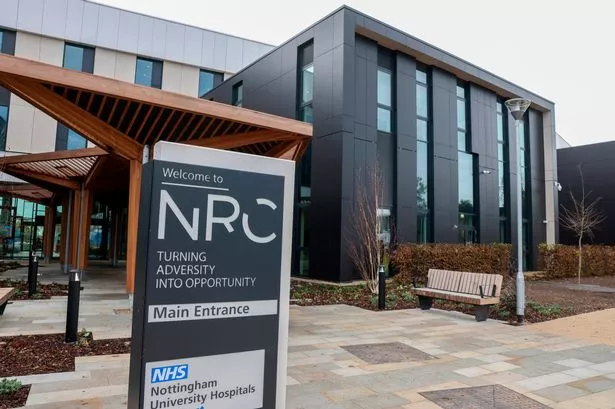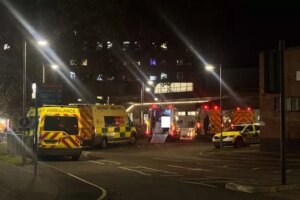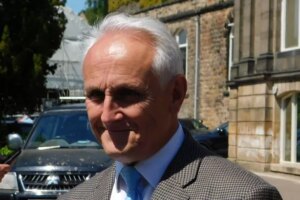
The 70-bed centre will help people recover from serious injuries and illnesses
20:14, 05 Nov 2025Updated 20:15, 05 Nov 2025
A 365-acre countryside estate, brimming with deciduous trees and birdsong, four miles away from the nearest major town.
It’s not a location you would expect to find a brand-new £105 million NHS facility in Nottinghamshire, especially one that is tipped to transform rehabilitation care across the country.
But the Stanford Hall Estate, just south of East Leake, is exactly where you will find the 70-bed National Rehabilitation Centre (NRC), a site which will help people recover from serious injuries and illnesses.
The centre, run by Nottingham University Hospitals (NUH), is tipped to shepherd in a “new era” of rehabilitation treatment, with bosses saying it will act as a blueprint for other trusts across the country.
The site was due to welcome its first patients on Tuesday, November 11, however this was delayed due to the quality of the water system not meeting safety and quality standards.
NUH chief executive Anthony May said the trust was ready to take the keys from building contractors, who are working to resolve the issue as “quickly as possible”.
Miriam Duffy, director of the NRC, said the project had been “a long time in the making”.
She said the centre will treat people from across the region who have either suffered from a “really serious” or potentially life-changing injury or illness, ranging from pancreatitis, fractures, broken bones and head and spine injuries.
Around 750 patients will use the centre each year, with stays expected to range from two weeks to three months.
The Queen’s Medical Centre’s major trauma centre, which covers the East Midlands, is the busiest in the country, which Ms Duffy put down a range of factors including major road crashes, inner city knife crime and extreme sports in the Peak District.
“This is about pulling them out of the acute trust, very, very quickly, putting the medical support around them so we can focus on their rehabilitation needs,” she said.
Director Miriam Duffy said the centre will be ‘transformative’ for recovery care(Image: Joseph Raynor/ Reach PLC)
Ms Duffy said the NRC team had spoken with centres across the world in an effort to mould their rehabilitation methods.
“This is transformative. This is the blueprint for rehabilitation going forward for the rest of the country. It’s starting here so we will always be that hub,” she said.
“It’s very different to what we’re doing at the moment, we’re taking people very early and it’s a very intense programme.”
Those being treated at the NRC will be offered support from six volunteer ‘patient ambassadors’, all of whom have been through intensive rehabilitation.
This includes Leah Washington-Pugh, who had one of her legs amputated after the Smiler rollercoaster crash at Alton Towers in 2015.
“I’ll come down to see them and have a chat with them. Be that friendly face,” said the 28-year-old.
“When I was in hospital a girl came to see me who was also an amputee. She gave me an idea of what was coming and what my future would look like.
“It is a minefield. You get chucked in this situation and then you’ve got to learn from scratch and figure everything out yourself. It’s a bit daunting.”
Leah Washington-Pugh, who survived the Smiler rollercoaster crash in 2015, will be an ambassador for patients(Image: Joseph Raynor/ Reach PLC)
Luke Pickering, another ambassador, was paralysed from “head to toe” in 2023 after being diagnosed with Guillain-Barré, a rare condition that affects the nerves.
“It’s a massive game-changer this is. It’s going to improve a lot of people’s recovery stages,” said the 32-year-old Annesley resident.
“The facilities they’ve got here, the technology, the views you’ve got.”
Mr Pickering said he took the role to “give back and help other people to give them that nudge of you can do it, you’ve just got to try.
“You do have dark days where you don’t want to get out of bed but you have to push yourself to a standard of living you want to get back to.”
Patients will benefit from ‘cutting edge’ technology(Image: Joseph Raynor/ Reach PLC)
Patients will have access to “ground-breaking” and “cutting edge” technology, including robots and devices, such as the first 360 degrees hoist in Europe.
Alison Wildt, NRC innovation lead, who will be one of 206 staff members at the centre, said this is the “polar opposite” of the trust’s existing Linden Lodge ward at City Hospital, which has one small gym and “very basic” rehabilitation equipment.
“We’re really lucky to have these facilities for our patients. We’ve been waiting for this for many years now and to actually be on the cusp of opening is super, super exciting,” she said.
Patients can also use advanced equipment at the the Defence Medical Rehabilitation Centre (DMRC), which is on the same site as the NRC.
Nick Carver, chair of NUH, said: “It’s difficult to overstate the importance of this facility. As a health service we have grossly underinvested in rehabilitation services.”
NUH chair Nick Carver(Image: Joseph Raynor/ Reach PLC)
He said a third of patients got back to their full potential, compared to at least half in much of Europe and the United States.
Mr Carver added: “This facility offers the potential to really get closer to that number and invest in people’s care early on and get them back to the fullest possible life and employment.”





